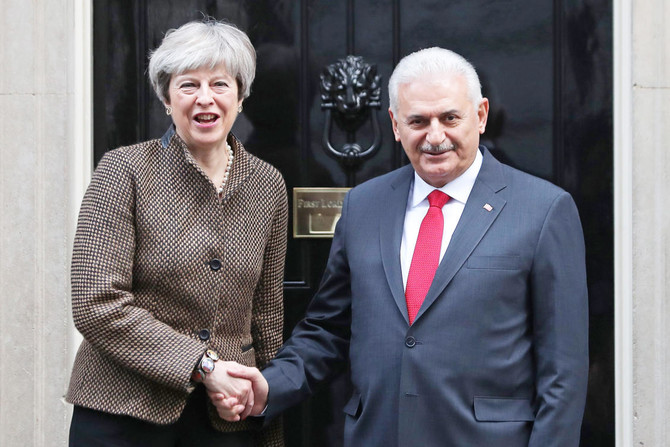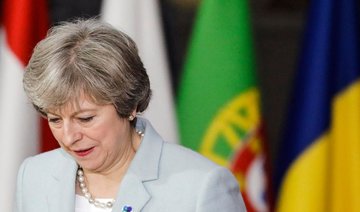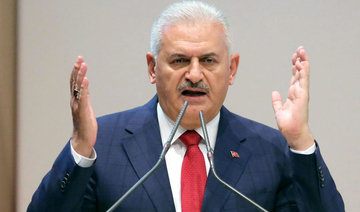ANKARA: Turkish Premier Binali Yildirim warned on Monday that Turkey could scrap its 2013 refugee deal with the EU if Syrian Kurdish militias are allowed to participate in Syria peace talks.
Speaking after a meeting with his British counterpart Theresa May in London, Yildirim’s comments came one day before the start of the sixth round of United Nations-sponsored talks in Geneva to find a political solution to the Syrian conflict.
Ankara is firmly opposed to the presence of the Syrian Kurdish groups the Democratic Union Party (PYD) and the People’s Protection Units (YPG) at the negotiation table as it considers them closely linked to the outlawed Kurdistan Workers Party (PKK) terror group which has been waging a bloody insurgency in Turkey for more than three decades.
Turkey currently hosts about 3.5 million refugees from neighboring Syria — the most of any country worldwide — and takes strict measures to prevent refugees from heading to Europe illegally through Turkish territory.
In return, the EU promised to grant Turkish nationals visa-free travel throughout the union, and offered a 6-billion-Euro aid package for refugees staying in Turkey. As of November 2017, the EU has initiated 55 projects with a total worth of over 1.78 billion Euros, of which 908 million have been distributed.
Yildirim denounced the 2013 deal as a “big lie,” saying the EU failed to keep its promise to grant visa-free travel to Turks and posited a hypothetical situation should Turkey renege on its part of the deal to prevent the refugees’ transit to Europe.
“We neutralized thousands of Daesh fighters and we are currently welcoming 3.5 million refugees in Turkey,” he said. “What happens if we tell them: ‘Here’s Europe, off you go.’ Can you imagine what would happen? Of course ... it is not something we will do,” he added.
It is not the first time that Turkey has threatened to scrap the refugee deal. During a diplomatic crisis when tensions ran high with Germany and Netherlands, President Recep Tayyip Erdogan and Foreign Minister Mevlut Cavusoglu warned that Turkey might cancel the migrant deal.
Ayselin Yildiz, UNESCO Chair on International Migration at Izmir’s Yasar University, believes migration issues should not be used as political bargaining chips.
“The main problem is about issues of border management, the readmission agreement, financial assistance, the fight against terrorism, and visa liberalization, which are all intermingled and set as a single package,” Yildiz told Arab News. “This type of conditionality blocks channels of further possible cooperation.”
However, Yildiz said that the current refugee deal — which she stressed was unethical and not in line with international law — may not have been as successful as Yildirim suggested in decreasing the crossings from Turkey to Europe. Instead, she claimed, it had simply forced refugees to take bigger risks to reach the EU.
“Our latest reports on the decision-making processes of migrants show that, after this deal, routes were diverted, modes of transport changed and — more crucially — stranded migrants and refugees were left in the hands of smugglers and human traffickers,” she said.
Aylin Noi, senior fellow at Johns Hopkins University SAIS — Center for Transatlantic Relations, said Ankara has repeatedly voiced its concerns about the inclusion of the PYD in negotiations about Syria’s post-Daesh reconstruction.
“Ankara argues that the presence of Kurdish separatists at the negotiation table goes against its priority of preserving Syrian territorial integrity, and that it could trigger a domino effect in the region,” Noi told Arab News.
“Following Ankara’s diplomatic maneuvers, Russia postponed the Syrian National Dialogue Congress until February 2018 because of disagreements over the participation of Syrian Kurds. Time will tell how Europe (stands) on this issue, and that will inevitably shape the implementation of EU-Turkey refugee deal in the near future,” she added.
The European Commissioner for Migration and Home Affairs Dimitris Avramopoulos told Turkey’s Hurriyet Daily News on Monday that “the EU is committed to fulfilling all elements of the EU-Turkey migration deal,” including visa-free European travel for Turkish citizens.
According to the European Commission, the number of refugee deaths in the Aegean Sea has declined considerably in recent years, and irregular arrivals through Turkey have decreased by 97 percent since the implementation of the deal.
“At this point in time, all parties must avoid anything that could undermine our cooperation and focus on mutual interests,” the commissioner added.
Turkey threatens to scrap refugee deal over Kurdish role in Syria peace talks
Turkey threatens to scrap refugee deal over Kurdish role in Syria peace talks

Libya war crimes probe to advance next year: ICC prosecutor

- The Security Council referred the situation in Libya to the ICC in February 2011 following a violent crackdown on unprecedented protests against the regime of Muammar Qaddafi
UNITED NATIONS, United States: The International Criminal Court prosecutor probing war crimes committed in Libya since 2011 announced Monday his plans to complete the investigation phase by the end of 2025.
Presenting his regular report before the United Nations Security Council, Karim Khan said that “strong progress” had been made in the last 18 months, thanks in particular to better cooperation from Libyan authorities.
“Our work is moving forward with increased speed and with a focus on trying to deliver on the legitimate expectations of the council and of the people of Libya,” Khan said.
He added that in the last six months, his team had completed 18 missions in three areas of Libya, collecting more than 800 pieces of evidence including video and audio material.
Khan said he saw announcing a timeline to complete the investigation phase as a “landmark moment” in the case.
“Of course, it’s not going to be easy. It’s going to require cooperation, candor, a ‘can do’ attitude from my office but also from the authorities in Libya,” he added.
“The aim would be to give effect to arrest warrants and to have initial proceedings start before the court in relation to at least one warrant by the end of next year,” Khan said.
The Security Council referred the situation in Libya to the ICC in February 2011 following a violent crackdown on unprecedented protests against the regime of Muammar Qaddafi.
So far, the investigation opened by the court in March 2011 has produced three cases related to crimes against humanity and war crimes, though some proceedings were abandoned after the death of suspects.
An arrest warrant remains in place for Seif Al-Islam Qaddafi, the son of the assassinated Libyan dictator who was killed by rebel forces in October 2011.
Libya has since been plagued by fighting, with power divided between a UN-recognized Tripoli government and a rival administration in the country’s east.
Palestinians rally at historic villages in northern Israel

- The descendants of the 160,000 Palestinians who managed to remain in what became Israel presently number about 1.4 million, around 20 percent of Israel’s population
- Israel has killed more than 35,000 Palestinians in Gaza, mostly women and children, according to the health ministry in the Hamas-run territory
SHEFA-AMR: Thousands of people took part Tuesday in an annual march through the ruins of villages that Palestinians were expelled from during the 1948 war that led to Israel’s creation.
Wrapped in keffiyeh scarves and waving Palestinian flags, men and women rallied through the abandoned villages of Al-Kassayer and Al-Husha — many holding signs with the names of dozens of other demolished villages their families were displaced from.
“Your Independence Day is our catastrophe,” reads the rallying slogan for the protest that took place as Israelis celebrated the 76th anniversary of the proclamation of the State of Israel.
The protest this year was taking place against the backdrop of the ongoing war in Gaza, where fighting between Israel and Palestinian militant group Hamas has displaced the majority of the population, according to the United Nations.
Among those marching Tuesday was 88-year-old Abdul Rahman Al-Sabah.
He described how members of the Haganah, a Zionist paramilitary group, forced his family out of Al-Kassayer, near the northern city of Haifa, when he was a child.
They “blew up our village, Al-Kassayer, and the village of Al-Husha so that we would not return to them, and they planted mines,” he said, his eyes glistening with tears.
The family was displaced to the nearby town of Shefa-Amr.
“But we continued (going back), my mother and I, and groups from the village, because it was harvest season, and we wanted to live and eat,” he said.
“We had nothing, and whoever was caught by the Israelis was imprisoned.”
Palestinians remember this as the “Nakba,” or catastrophe, when around 760,000 Palestinians fled or were driven from their homes during the war that led to the creation of Israel.
The descendants of the 160,000 Palestinians who managed to remain in what became Israel presently number about 1.4 million, around 20 percent of Israel’s population.
Many of today’s Arab Israelis remain deeply connected to their historic land.
At Tuesday’s march, one man carried a small sign with “Lubya,” the name of what was once a Palestinian village near Tiberias.
Like many other Palestinian villages, Al-Husha and Al-Kassayer witnessed fierce battles in mid-April 1948, according to historians of the Haganah, among the Jewish armed groups that formed the core of what became the Israeli military.
Today, the kibbutz communities of Osha, Ramat Yohanan and Kfar Hamakabi can be found on parts of land that once housed the two villages.
“During the attack on our village Al-Husha, my father took my mother, and they rode a horse to the city of Shefa-Amr,” said Musa Al-Saghir, 75, whose village had been largely made up of people who immigrated from Algeria in the 1880s.
“When they returned to see the house, the Haganah forces had blown up the village and its houses,” said the activist from a group advocating for the right of return for displaced Arabs.
Naila Awad, 50, from the village of Reineh near Nazareth, explained that the activists were demanding both the return of displaced people to their demolished villages within Israel, as well as the return of the millions of Palestinian refugees living in the West Bank, Gaza and other countries.
“No matter how much you try to break us and arrest us, we will remain on our lands,” she insisted.
Egypt rejects Israel’s denial of role in Gaza aid crisis

- Sameh Shoukry: “Egypt affirms its categorical rejection of the policy of distorting the facts and disavowing responsibility followed by the Israeli side”
CAIRO: Egypt’s foreign minister on Tuesday accused Israel of denying responsibility for the humanitarian crisis in Gaza after his Israeli counterpart said Egypt was not allowing aid into the war-torn territory.
Israeli troops on May 7 said they took control of the Palestinian side of the Rafah crossing to Egypt as part of efforts to root out Hamas militants in the east of Rafah city.
The move defied international opposition and shut one of the main humanitarian entry points into famine-threatened Gaza. Since then, Egypt has refused to coordinate with Israel aid access through the Rafah crossing.
Sameh Shoukry, Egypt’s foreign minister, said in a statement that “Egypt affirms its categorical rejection of the policy of distorting the facts and disavowing responsibility followed by the Israeli side.”
In a tweet on social media platform X, Israeli Foreign Minister Israel Katz had said, “Yesterday, I spoke with UK Foreign Secretary David Cameron and German Foreign Minister Annalena Baerbock about the need to persuade Egypt to reopen the Rafah crossing to allow the continued delivery of international humanitarian aid to Gaza.”
Katz added that “the key to preventing a humanitarian crisis in Gaza is now in the hands of our Egyptian friends.”
Shoukry, whose country has tried to mediate a truce in the Israel-Hamas war, responded that “Israel is solely responsible for the humanitarian catastrophe that the Palestinians are currently facing in the Gaza Strip.”
He added that Israeli control of the Palestinian side of the Rafah border crossing and its military operations exposes “aid workers and truck drivers to imminent dangers,” referencing trucks awaiting entry to Gaza.
This, he said, “is the main reason for the inability to bring aid through the crossing.”
UN chief Antonio Guterres said he is “appalled” by Israel’s military escalation in Rafah, a spokesman said.
Guterres’ spokesman Farhan Haq said “these developments are further impeding humanitarian access and worsening an already dire situation,” while also criticizing Hamas for “firing rockets indiscriminately.”
Since Israeli troops moved into eastern Rafah, the aid crossing point from Egypt remains closed and nearby Kerem Shalom crossing lacks “safe and logistically viable access,” a UN report said late on Monday.
Daesh claims attack on army post in northern Iraq

- Daesh said in a statement on Telegram it had targeted the barracks with machine guns and grenades
BAGHDAD: Daesh claimed responsibility on Tuesday for an attack on Monday targeting an army post in northern Iraq which security sources said had killed a commanding officer and four soldiers.
The attack took place between Diyala and Salahuddin provinces, a rural area that remains a hotbed of activity for militant cells years after Iraq declared final victory over the extremist group in 2017.
Security forces repelled the attack, the defense ministry said on Monday in a statement mourning the loss of a colonel and a number of others from the regiment. The security sources said five others had also been wounded.
Daesh said in a statement on Telegram it had targeted the barracks with machine guns and grenades.
Iraq has seen relative security stability in recent years after the chaos of the 2003-US-led invasion and years of bloody sectarian conflict that followed.
Israeli forces repeatedly target Gaza aid workers, says Human Rights Watch

- They are among more than 250 aid workers who have been killed in Gaza since the war erupted more than seven months ago, according to UN figures
- Israel has killed more than 35,000 Palestinians in Gaza, mostly women and children, according to the health ministry in the Hamas-run territory
JERUSALEM: Human Rights Watch said on Tuesday that Israel had repeatedly targeted known aid worker locations in Gaza, even after their coordinates were provided to Israeli authorities to ensure their protection.
The rights watchdog said that it had identified eight cases where aid convoys and premises were targeted, killing at least 15 people, including two children.
They are among more than 250 aid workers who have been killed in Gaza since the war erupted more than seven months ago, according to UN figures.
In all eight cases, the organizations had provided the coordinates to Israeli authorities, HRW said.
This reveals “fundamental flaws with the so-called deconfliction system, meant to protect aid workers and allow them to safely deliver life-saving humanitarian assistance in Gaza,” it said.
“On one hand, Israel is blocking access to critical lifesaving humanitarian provisions and on the other, attacking convoys that are delivering some of the small amount that they are allowing in,” Belkis Wille, HRW’s associate crisis, conflict and arms director, said in Tuesday’s statement.
HRW highlighted the case of the World Central Kitchen, a US-based charity who saw seven of its aid workers killed by an Israeli strike on their convoy on April 1.
This was not an isolated “mistake,” HRW said, pointing to the other seven cases it had identified where GPS coordinates of aid convoys and premises had been sent to Israeli authorities, only to see them attacked by Israeli forces “without any warning.”





















